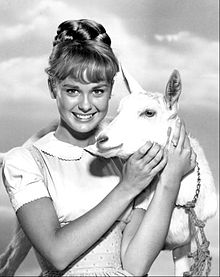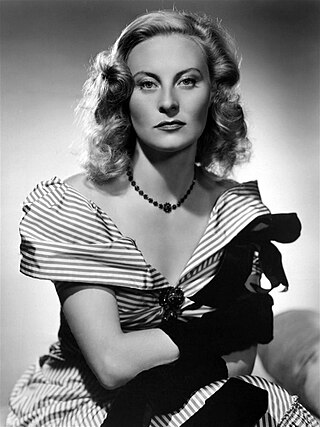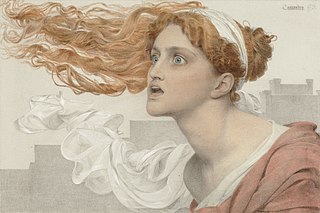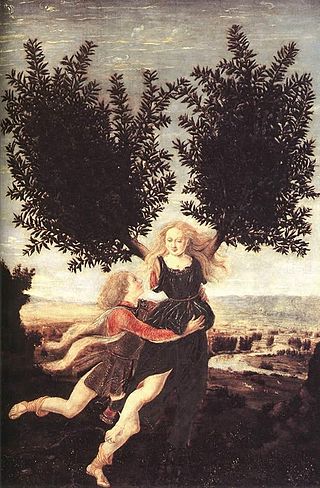Tammy  |
|
| Word/name | Hebrew or Greek via Aramaic |
|---|
| Meaning | "palm tree" or "twin" |
|---|
|
| Related names | Tamar, Tamara, Tambrey, Tami, Tamie, Tammi, Tammie, Tamsin, Thomas, Thomasin, Thomasina |
|---|
Tammy is a feminine given name. It can be a short form of the names Tamsin, Thomasina, Thomasin, or Tamar, Tamara or other names starting with Tam. [1] Tamsin, Thomasina, and Thomasin are feminine versions of the name Thomas, a Greek form of the Aramaic name Te'oma, meaning twin . [2] Tamara is a Russian form of the Hebrew name Tamar, which means "palm tree". [3] In Israel "Tami" (תמי) is commonly used as an abbreviation of the original Hebrew name.
Tammy originated as a Scottish nickname for boys named Tàmhas, the Scottish Gaelic version of Thomas. The name was also used in England as a nickname for girls named Tamsin, a shortened version of Thomasina or Thomasin, all feminine versions of Thomas. Tammy was in greatest use in the 19th century in the southwestern English counties of Devon and Cornwall. United States census records show the name was also in rare use for American girls in the 19th century, either as an independent name or as a nickname for Tamsin or for Tamar and its phonetic variants Tama and Tamma. Tamara began to be used in greater numbers in the United States in the 1930s. Tammy as an independent name remained rare in the Anglosphere until the mid-20th century when it gained popularity due to Tammy Tyree, the main character of Cid Ricketts Sumner's 1948 novel Tammy Out of Time about a lovable backwoods girl who falls in love with a plane crash survivor. There were 39 times more American girls named Tammy born in 1958 than there were in 1956. The increase in popularity was due to the 1957 romantic comedy film Tammy and the Bachelor , which was based on Sumner's novel, and the hit song from the film, Tammy . The full name of the book and film character was Tambrey, an invention by Sumner inspired by Ambry, from the 1852 book Lexicon of Ladies’ Names With Their Floral Emblems by American Sarah Carter, in which Ambry is said to be derived from the name of the amaranth plant, symbolizing eternal life. [4] The 1957 film was followed by three loosely related films on the same theme in 1961, 1963, and 1967. There was also a 1965 American television series based on the book and movies.
The name peaked in usage in the United States in 1968, when it was the eighth most pooular name for newborn American girls. If spelling variants Tami, Tamie, Tammi and Tammie were combined with Tammy, the name would have been the fifth most popular name for American girls in 1968. [5] The name remained well-used throughout the 1970s, 1980s and into the mid-1990s in the United States but has since declined in use. It has not been ranked among the top 1,000 names for girls born in the United States since 1998. It was also the 959th most popular name for boys born between 1960 and 1969 in the United States, but has not appeared among the top 1,000 names for boys there since the 1960s. Tammy was most well used in Australia from 1969 to 1981, in Canada from 1969 to 1982, and in England and Wales from 1996 to 2006. [6]
Amy is an English feminine given name, the English version of the French Aimée, which means beloved. It was used as a diminutive of the Latin name Amata, a name derived from the passive participle of amare, “to love”. The name has been in use in the Anglosphere since the Middle Ages. It was among the 50 most popular names for girls in England between 1538 and 1700. It was popularized in the 19th century in the Anglosphere by a character in Sir Walter Scott's 1821 novel Kenilworth, which was based on the story of Amy Robsart. Enslaved Black women in the United States prior to the American Civil War were more likely to bear the name than white American women because slave masters often chose their names from literary sources. The name declined in use after 1880 but was revived due to the hit song Once in Love with Amy from the 1948 Broadway musical Where's Charley?. The name peaked in usage in the United States between 1973 and 1976, when it was among the five most popular names for American girls. It remained among the top 250 names for American girls in the early 2020s.
Thomasina,Thomasine, orThomasena is the feminine form of the given name Thomas, which means "twin". Thomasina is often shortened to Tamsin. Tamsin can be used as a name in itself; variants of Tamsin include Tamsyn, Tamzin, Tamsen, Tammi and Tamasin. The version "Tamsin" is especially popular in Cornwall and Wales. Along with Tamara it is the ancestor of "Tammy".

Tammy is an American sitcom, starring Debbie Watson in the title role. Produced by Universal City Studios, 26 color half-hour episodes were aired on ABC from September 17, 1965, to March 11, 1966.

Michelle is a given name, originally a variant of Michèle, the French feminine form of Michel, derived from the Hebrew name Michael meaning "Who is like God?". The usual Latin feminine form of the name was Michaela, with Michael the vernacular form for both men and women. The name was given in reference to the archangel Michael, a saint of the Roman Catholic Church. The usual French feminine form of the name was Micheline. The name Michelle was rare until the 20th century. It became a popular name in France and later throughout the Anglosphere after 1930, popularized by French-born film actress Michèle Morgan, who was born Simone Roussel. The name was further popularized by the 1967 hit Beatles song Michelle. The name peaked in usage for American girls in 1968, when it was among the five most popular names for newborn girls. The name has since declined in popularity but remains in regular use in English-speaking as well as French-speaking countries.
Tamara is a feminine given name of Hebrew, Arabic, Spanish, Hindi, Sanskrit and Russian origins. It means date, date palm or palm tree and it is derived from biblical name Tamar and in the Arabic from the singular form Tamra and the plural form Tamar. It used to be a common name in the 1970s in the English-speaking world. The variant, Tamar, is the second most popular name in Israel; it is also popular in Russia.
The Tammy movies are a series of four light-hearted American films about a naive young lady from Mississippi. They were produced by Universal between 1957 and 1967, and based on the character created in Cid Ricketts Sumner's 1948 book Tammy Out of Time.

Jennifer, also spelled Jenifer or Jenefer, is a feminine given name, the Cornish form of Guinevere, that became popular in the English-speaking world in the 20th century.

Molly is a diminutive of the feminine name Mary that, like other English diminutives in use since the Middle Ages, substituted l for r. English surnames such as Moll, Mollett, and Mollison are derived from Molly. Molly has also been used as a diminutive of Margaret and Martha since the 1700s and as an independent name since at least 1720. The name was more popular in the United States than elsewhere in the Anglosphere in the 1800s due to usage by Irish-American families and by Jewish American families who used Molly as an English version of Hebrew names such as Miriam and Malka. Its popularity with Americans was also influenced by stories about Molly Pitcher, a heroine of the American Revolutionary War.

Miranda is a feminine given name of Latin origin, meaning "worthy of admiration". William Shakespeare invented the name for a character in his play The Tempest, deriving the feminine name from the Latin word mirandus. In the play, the character is addressed as “Admired Miranda! Indeed the top of admiration! Worth what’s dearest to the world!” People named their daughters after the Shakespearean character beginning in the 1700s. The name was more popular in the United States than elsewhere in the Anglosphere, possibly due to its similarity in sound to Amanda, a name also more common for American girls by the 1800s. The name declined in use after 1900 but was revived in the United Kingdom due to the popularity of the 1948 British fantasy film Miranda about a mermaid named Miranda. The name also increased in usage in the United States when the film began airing on television there in the 1950s. Other media influences also increased usage of the name through the early 2000s. The name has recently declined in usage in the United States due to negative associations with the satirical character Miranda Sings.

Hazel is a primarily female given name meaning "hazel", from the name of the tree or the color. It is derived from the Old English hæsel. It became a popular name in English-speaking countries during the 19th century, along with other names of plants or trees used for girls.

Ivy is a given name or surname taken from the name of the plant. It became popular as a given name in the late 1800s along with other plant and flower names for girls. As a given name for girls, Ivy first entered the Top 200 in England and Wales in 1880, when it ranked #180, and reached the height of popularity when it was the 16th most popular name in England and Wales in 1904. It has again risen in popularity and, as of 2020, Ivy was the sixth most popular girls' name in England and Wales. It has also risen in popularity in other English speaking countries. It has ranked among the top 50 names for newborn American girls since 2021 and was the 42nd most used name for girls there in 2022. Other botanical names are also currently fashionable, as are other names that contain the letter v.
Shawn is a unisex given name, an anglicized spelling of the Irish name Seán. Alternate spellings include Shawne, Shaun and Sean. Notable people with the name include:

Camilla and Camila are feminine given names. They originate as the feminine of camillus, a term for a youth serving as acolyte in the ritual of ancient Roman religion, which may be of Etruscan origin.

Cassandra, also spelt Kassandra, is a feminine given name of Greek origin. Cassander is the masculine form of Cassandra. In Greek mythology, Cassandra was the daughter of King Priam and Queen Hecuba of Troy. She had the gift of prophecy, but was cursed so that none would believe her prophecies. The name has been in occasional use since the Middle Ages. The usual English nickname is Cassie. Cassandre is the French version of the name.

Goldie is a nickname or given name used in reference to an informal English diminutive word for gold or an English version of the Yiddish name Golda or Golde, also meaning gold. It was often used as a pet name for a girl with blonde hair. It is also used as a nickname for formal names such as Marigold. It has a “vintage vibe” for some parents who have considered it. Other commentators note that the name has risen in use for girls along with other names of a similar style that all exude cuteness and promote enjoyment, perhaps in reaction to serious times. The English expression good as gold is often used to describe people who act virtuously and, in the case of children, are well-behaved.
Sally is an English language feminine given name that originated as a hypocorism for Sarah. Young children often have difficulty in pronouncing the letter r, which resulted in nicknames like Sally that substitute the letter r for l. Other examples include Dolly for Dorothy, Hallie for Harriet, Lolly for Laura, and Molly or Polly for Mary. Sally and spelling variant Sallie have also been in use as independent names since the 1700s. The name was popularized by cultural influences in the early 20th century, including the popular Broadway musical Sally, which debuted in 1920. Actress Marilyn Miller played Sally on stage and a 1929 film. An earlier film featured Colleen Moore in the role of Sally. The popularity of performer Sally Rand also increased usage of Sally in the Anglosphere in the 1920s and 1930s. In the United States, the name was among the top 100 names for American girls until 1956. It reached the peak of its popularity in 1939, when it was the 52nd most popular names for American girls. It then declined in use, but had a brief increase in use in the late 1970s due to the influence of the American actress Sally Field. It is also a nickname for Salome and Salimeh, which are especially popular in the Eurasian country Georgia.
Tami is a given name and nickname, usually feminine, which may refer to:

Daphne is a feminine given name of Greek origin meaning laurel. It originates from Greek mythology, where Daphne was a naiad, a variety of female nymph associated with fountains, wells, springs, streams, brooks and other bodies of freshwater. The name came into popular use in the Anglosphere in the late 1800s along with other flower, tree, and plant names that were in vogue at the time. In the United States, the name was in use for enslaved African-born women named by enslavers who used names from the Ancient Greek and Roman classics for the enslaved population in order to display their education to their contemporaries. United States census records from the 1800s show a majority of the women bearing the name in the pre-Civil War era there were Black. The name was also in rare use in the United Kingdom in the late 18th and early 19th centuries, where a working class mother and daughter in Scotland were both named Daphne. The name became fashionable for daughters born to aristocratic families in Britain in the late 1800s and early 1900s. The name increased in use in the Anglosphere after author Daphne du Maurier rose to prominence in the 1940s and 1950s. Usage also increased after the name was used for characters in novels or television productions such as the popular 1960s American television series Surfside 6 in which Diane McBain played socialite Daphne Dutton, who had her own yacht called the Daffy II. After the show first aired, the name Daphne tripled in use for newborn American girls between 1960 and 1962. In recent years, the name has increased in usage due to the aristocratic character Daphne Bridgerton on the 2020s Netflix streaming television series Bridgerton.
Nova is a given name of Latin origin meaning "new".











